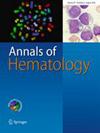TP53 deletion is associated with poor survival of adult ALK-positive ALCL patients receiving CHOP-based chemotherapy
Abstract
In most cases of anaplastic lymphoma kinase–positive anaplastic large cell lymphoma (ALK + ALCL), long-term survival is achieved using CHOP therapy. However, some cases have a poor prognosis. Here, we investigated the clinical impact of TP53 deletion on adult ALK + ALCL patients via a multicenter, retrospective analysis. TP53 deletion was evaluated by fluorescence in situ hybridization (FISH) using paraffin sections of lymphoma samples. To re-evaluate the FISH results, whole genome copy number changes were analyzed in DNA extracted from paraffin sections using OncoScan analysis. Fourteen patients treated with first-line chemotherapy enrolled at six centers were analyzed. All patients received CHOP-based therapy as initial therapy. The 5-year progression-free survival (PFS) and overall survival (OS) of the 14 patients were 28.6% (median 7 months) and 57.1% (median 99 months), respectively. FISH analysis revealed 6 (43%) patients were positive for TP53 deletion (deletion group) and 8 (57%) were negative (non-deletion group). All six patients in the deletion group were diagnosed at an advanced stage; five were refractory to initial treatment, one relapsed after treatment, and all patients died of ALK + ALCL. The median PFS was 3.5 months in the deletion group and 76 months in the non-deletion group. The median OS was 7 months in the deletion group and has yet to be confirmed in the non-deletion group. OncoScan analysis showed TP53 copy number reduction in the deletion group and no TP53 copy number abnormalities in the non-deletion group. This study suggests that TP53 deletion is a poor prognostic factor in ALK + ALCL treated with CHOP-based therapy.

 求助内容:
求助内容: 应助结果提醒方式:
应助结果提醒方式:


